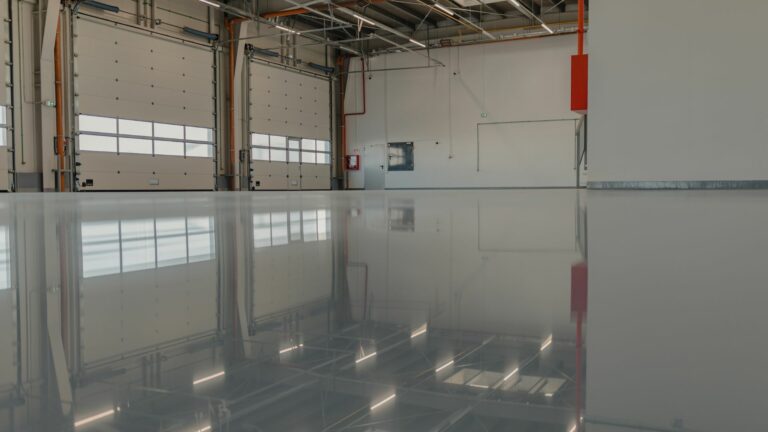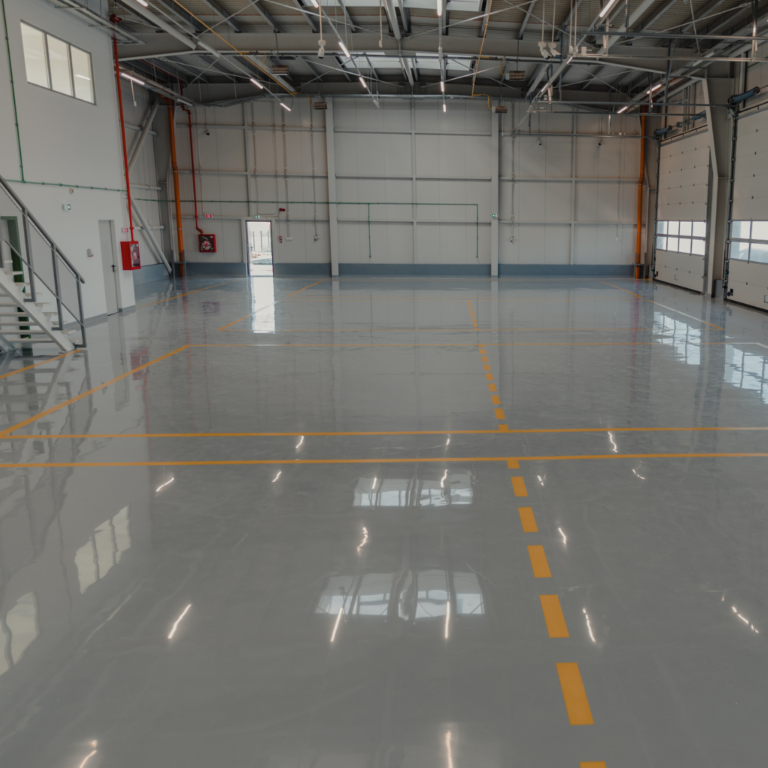Selecting the right flooring is a crucial decision for homeowners and business owners. The right choice enhances aesthetics and impacts durability, maintenance, and overall functionality. Whether it’s a residential garage, a commercial showroom, or an industrial workspace, the flooring must withstand daily wear and tear while complementing the space’s design.
In recent years, epoxy flooring in Huntsville, AL, has surged in popularity due to its unmatched durability, sleek finish, and resistance to stains, chemicals, and heavy traffic. More property owners are turning to epoxy flooring as a long-lasting, low-maintenance alternative to traditional options like tile, hardwood, and concrete.
What is Garage Floor Coating?
Garage floor coating is a protective layer applied over concrete floors to enhance their durability, appearance, and overall functionality. The primary purpose of a garage floor coating is to protect the underlying concrete from damage caused by everyday wear and tear, including stains from oil, chemicals, moisture, and foot traffic. In addition to protection, garage floor coatings can significantly enhance the appearance of your garage, transforming it from a simple, utilitarian space into a well-organized and visually appealing area.
There are several types of garage floor coatings available, but epoxy floor coatings and polyaspartic floors are two of the most popular choices. These coatings are specifically designed to withstand the unique demands of a garage environment, offering both aesthetic appeal and long-lasting protection.

Common Types of Garage Floor Coatings
Epoxy Floor Coating
Epoxy is one of the most widely used coatings for garage floors due to its exceptional strength, durability, and versatility. It consists of a resin and hardener that, when mixed, chemically bond to form a thick, solid layer. Epoxy floor coatings are ideal for those seeking a budget-friendly option that provides a high level of protection against stains, abrasions, and moisture.
Polyaspartic Floors
Polyaspartic coatings are a relatively new option compared to epoxy, but they have quickly gained popularity due to their advanced features. Polyaspartic floors are fast-drying, UV-resistant, and highly durable, making them ideal for both residential and commercial garages. They provide a high-gloss finish and are highly resistant to scratches, chemicals, and extreme temperatures.
Epoxy Floor Coating
Epoxy is one of the most widely used coatings for garage floors due to its exceptional strength, durability, and versatility. It consists of a resin and hardener that, when mixed, chemically bond to form a thick, solid layer. Epoxy floor coatings are ideal for those seeking a budget-friendly option that provides a high level of protection against stains, abrasions, and moisture.
Polyaspartic Floors
Polyaspartic coatings are a relatively new option compared to epoxy, but they have quickly gained popularity due to their advanced features. Polyaspartic floors are fast-drying, UV-resistant, and highly durable, making them ideal for both residential and commercial garages. They provide a high-gloss finish and are highly resistant to scratches, chemicals, and extreme temperatures.
Differences Between Epoxy and Polyaspartic Garage Floor Coatings
While both epoxy floor coatings and polyaspartic floors offer exceptional protection, some key differences set them apart:
-
Durability and Resistance
Epoxy is highly durable and resistant to many chemicals, but polyaspartic coatings offer even greater resistance to scratches, impacts, and UV damage. Polyaspartic floors are particularly effective in areas where exposure to direct sunlight may cause other coatings to yellow or fade over time. -
Curing Time
Epoxy coatings typically require 24 to 72 hours to cure, making them fully usable. At the same time, polyaspartic floors can be installed and cured in a matter of hours, making them an excellent option for those seeking a quicker turnaround. -
Application Conditions
Epoxy requires specific temperature conditions for optimal application, often needing warmer weather or controlled environments. Polyaspartic floors, on the other hand, are more flexible and can be applied in a broader range of temperatures, making them an attractive choice for regions with fluctuating climates. -
Aesthetic Appeal
Both coatings offer customizable colors and finishes, but polyaspartic floors tend to have a higher gloss finish, resulting in a more polished and sleek appearance. Epoxy, while versatile, may not achieve the same level of sheen and may require additional layers to achieve a glossy finish.
5. Cost
While polyaspartic floors tend to be more expensive upfront, they offer a quicker installation and longer-lasting results, which can make them a more cost-effective option in the long term. Epoxy coatings, although initially more affordable, may require more maintenance or reapplication over time.
Benefits of Epoxy Floor Coating for Garages
-
Durability
Epoxy floor coating is incredibly durable and can withstand heavy foot traffic, the weight of car tires, and even spills from chemicals or oils commonly found in garages. It forms a rigid, long-lasting surface that helps protect your concrete floor from cracks, stains, and general wear and tear. -
Aesthetic Appeal
Epoxy coatings not only protect your floor but also enhance its appearance. With a wide range of colors and finishes available, you can customize your garage floor to match your style. Whether you prefer a sleek, glossy look or a more matte finish, epoxy can transform a dull concrete floor into a visually striking surface. -
Low Maintenance
One of the significant advantages of an epoxy-coated garage floor is its ease of maintenance. Cleaning is a breeze—sweeping or mopping up spills is all it takes to keep it looking like new. The smooth, non-porous surface resists dirt and stains, so you won’t have to worry about time-consuming upkeep.
Cost-Effective
When compared to other flooring options, epoxy coatings are relatively affordable. While higher-end possibilities, such as tiles or polished concrete, can be expensive, epoxy offers excellent value for its price. Plus, its durability means you’ll likely spend less on repairs and replacements over time.
Polyaspartic Garage Floors: The Superior Alternative
- Fast Installation
Polyaspartic garage floors are known for their fast installation process. Unlike traditional epoxy coatings, which can take several days to cure, polyaspartic floors typically dry within a few hours. This makes them an excellent choice for homeowners seeking to restore their garage for use with minimal downtime. - UV Resistance
One of the standout features of polyaspartic coatings is their excellent UV resistance. Unlike epoxy, which can yellow or fade when exposed to sunlight over time, polyaspartic floors maintain their vibrant color and glossy finish. This makes them ideal for garages with ample natural light or those situated in sunny climates. - Enhanced Durability
Polyaspartic floors are incredibly tough. They provide superior resistance to scratches, impacts, and chemical spills, making them ideal for high-traffic garages or environments where heavy equipment and chemicals are present. Their extreme durability ensures that your garage floor stays protected for years, even under the most demanding conditions. - Temperature Flexibility
Polyaspartic coatings offer a significant advantage in terms of temperature flexibility. They can be applied in a much wider range of temperatures than epoxy, which typically requires warm conditions to cure correctly. This makes polyaspartic floors a reliable choice in regions with fluctuating weather conditions or for garages that are not temperature-controlled.
Overall, polyaspartic garage floors offer faster installation, improved UV resistance, increased durability, and the ability to be applied in a wide range of temperatures, making them an excellent alternative to traditional epoxy coatings.
Epoxy vs. Polyaspartic Garage Floors: Which One is Right for You?
When choosing between epoxy and polyaspartic garage floors, it is essential to consider the differences that matter most to your specific needs. Here’s a side-by-side comparison to help you decide:
- Installation Time
- Epoxy: Epoxy coatings typically require more time to install and cure. After application, it may take 24 to 72 hours for the coating to fully heal, depending on its thickness and the surrounding temperature. This means your garage may be unavailable for a few days.
- Polyaspartic: One of the significant advantages of polyaspartic floors is their fast curing time. They can be installed and fully cured in just a few hours, making them a perfect choice for homeowners who require quick results and minimal downtime.
- Epoxy: Epoxy coatings typically require more time to install and cure. After application, it may take 24 to 72 hours for the coating to fully heal, depending on its thickness and the surrounding temperature. This means your garage may be unavailable for a few days.
- Durability and Wear Resistance
- Epoxy: Epoxy is durable and resistant to many types of damage, including light chemical spills, abrasions, and tire marks. However, it may not withstand extreme wear, such as heavy impacts or repeated exposure to harsh chemicals.
- Polyaspartic: Polyaspartic coatings are known for their superior durability. They provide exceptional resistance to scratches, impacts, chemicals, and UV damage. They are especially effective in high-traffic garages or areas where heavy machinery or automotive chemicals are used.
- Epoxy: Epoxy is durable and resistant to many types of damage, including light chemical spills, abrasions, and tire marks. However, it may not withstand extreme wear, such as heavy impacts or repeated exposure to harsh chemicals.
- Aesthetic Options
- Epoxy: Epoxy coatings offer a wide range of colors and finishes, and can be customized with decorative flakes, metallic effects, or even custom logos. It’s an excellent option for creating a polished and unique look in your garage.
- Polyaspartic: While both coatings offer aesthetic versatility, polyaspartic floors tend to have a higher gloss finish. This gives them a more polished and sleek appearance. Additionally, polyaspartic coatings tend to maintain their appearance longer without yellowing or fading under UV exposure.
- Epoxy: Epoxy coatings offer a wide range of colors and finishes, and can be customized with decorative flakes, metallic effects, or even custom logos. It’s an excellent option for creating a polished and unique look in your garage.
- Cost
- Epoxy: Epoxy coatings are generally more affordable upfront, making them a budget-friendly option for many homeowners. However, they may require more maintenance and reapplication over time, which could result in additional costs in the future.
- Polyaspartic: Polyaspartic coatings are more expensive initially but can offer better long-term value. Their faster installation and greater durability result in fewer maintenance costs and a longer-lasting finish, making them a wise investment for those seeking a high-performance floor that stands the test of time.
- Epoxy: Epoxy coatings are generally more affordable upfront, making them a budget-friendly option for many homeowners. However, they may require more maintenance and reapplication over time, which could result in additional costs in the future.
How to Choose the Right Garage Floor Coating
Choosing the right garage floor coating depends on several factors, including how you use your garage, the local climate, and your budget. Below, we break down how to make the best decision between epoxy floor coating and polyaspartic garage floors based on these key considerations.
1. Usage: High-Traffic vs. Light-Traffic Garages
- High-Traffic Garage (e.g., used for working on cars, heavy equipment, or storing large items):
If your garage experiences frequent foot traffic, heavy machinery, or chemical exposure, polyaspartic floors are a great option due to their superior durability, resistance to scratches, and faster drying time. Polyaspartic coatings offer more resilience against wear and tear in high-traffic environments. - Light-Traffic Garage (e.g., used for parking cars, light storage, or as a hobby space):
If your garage is primarily used for parking cars or storing lighter-duty items, an epoxy floor coating is a cost-effective and reliable solution. It offers strong protection for everyday use and is highly durable against typical garage wear and tear.
2. Climate: How Regional Weather Conditions Might Affect Your Choice
- Hot, Humid, or Wet Climates:
If you live in an area with extreme weather conditions, such as intense heat, humidity, or wet environments, polyaspartic floors are better suited for the job. They offer excellent UV resistance, which prevents yellowing in direct sunlight, and their ability to handle moisture makes them ideal for garages prone to humidity or rain. - Milder Climates:
For regions with moderate temperatures and less severe weather conditions, epoxy coatings are well-suited. While they may not have the same UV resistance as polyaspartic floors, epoxy still provides solid protection and performs well in most climates.
3. Budget: How Much Are You Willing to Invest
- Limited Budget:
If you’re looking for an affordable, long-term solution that won’t break the bank, epoxy floor coatings are the ideal choice. They are generally less expensive upfront and provide excellent value for their cost. However, you may need to reapply the coating over time, depending on usage and wear. - Higher Budget:
If you’re willing to invest more for a premium product that offers fast installation, greater durability, and superior resistance to UV and chemicals, polyaspartic floors are an excellent option. Although the initial cost is higher, the added benefits and longer lifespan may make the investment worthwhile.
Why Professional Garage Floor Coating Installation is Key
Why Professional Garage Floor Coating Installation is Key
When it comes to garage floor coatings, whether you’re choosing epoxy or polyaspartic, professional installation is essential for ensuring a flawless, long-lasting finish. While DIY installation may seem like a cost-effective way to save money, it can lead to several issues that could compromise the durability, appearance, and performance of your garage floor in the long run.
The Importance of Professional Installation
- Expert Knowledge
Professional installers have the expertise and experience to properly prepare and apply the coating, ensuring a high-quality finish. They know the correct methods for surface preparation, mixing the coating materials, and using them evenly. Their knowledge of various coatings ensures that your floor will look great and perform optimally for years to come. - Long-Lasting Results
Garage floor coatings require precise application to bond properly with the concrete surface. When done correctly, the coating will protect your garage floor from stains, moisture, and wear. Professional installers understand how to achieve the right thickness and coverage, which is key to the floor’s long-term durability.
Potential Issues with DIY Installation
- Uneven Application
One of the most common problems with DIY garage floor coating is uneven application. Without professional experience, it’s easy to apply too much or too little coating in certain areas, resulting in streaks, inconsistencies, or patches that look unsightly. Uneven coverage can also affect the performance of the coating, making it more vulnerable to damage. - Improper Curing
Both epoxy and polyaspartic coatings require proper curing to achieve maximum hardness and durability. If not applied or cured correctly, the coating may remain soft, sticky, or prone to peeling. Professional installers ensure the coating is mixed correctly, applied in optimal conditions, and allowed to cure for the right amount of time, which is crucial for achieving a durable, long-lasting surface. - Surface Preparation
Proper surface preparation is key to the success of any garage floor coating. Professionals know how to clean, etch, and prime the concrete to ensure that the coating bonds effectively. Without thorough preparation, the coating might not adhere properly, leading to peeling or bubbling over time.
Rocket City Epoxy’s Professional Installation Services
At Rocket City Epoxy, our team of experienced professionals handles everything, from surface preparation to final coating application. We use high-quality materials and advanced techniques to ensure that your garage floor not only looks fantastic but is also resistant to wear, stains, and chemicals. Our experts will provide a flawless, even application, ensuring that your epoxy floor coating or polyaspartic garage floor is both durable and aesthetically pleasing.
By choosing professional installation from Rocket City Epoxy, you can avoid the common pitfalls of DIY projects and ensure that your garage floor remains in top condition for years to come.
Choosing the Right Garage Floor Coating for Your Home
To wrap things up, both epoxy floor coatings and polyaspartic garage floors bring significant benefits to your garage. Epoxy is a durable and cost-effective choice that can withstand everyday wear and tear, while polyaspartic floors offer faster installation, enhanced durability, and UV resistance—perfect for high-traffic garages or areas with extensive sunlight exposure.
Regardless of which option you choose, professional installation is crucial to ensuring your garage floor lasts and looks great. At Rocket City Epoxy, our team provides a smooth, flawless finish that will stand the test of time.
Ready to upgrade your garage floor? Contact Rocket City Epoxy today to schedule a complimentary consultation or receive a quote. We’re here to help you make your garage look its best with a professional, long-lasting coating!

